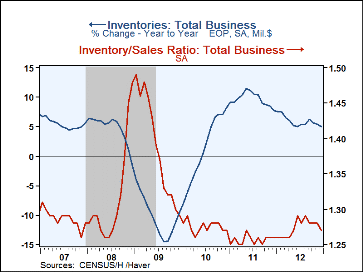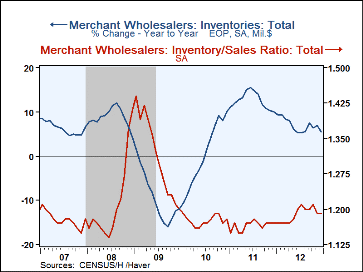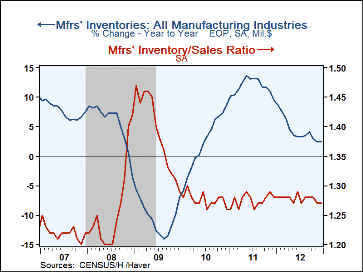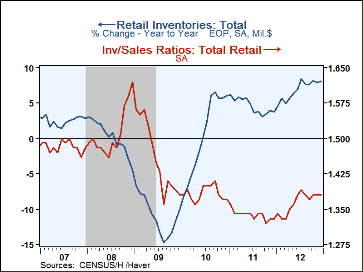 Global| Feb 14 2013
Global| Feb 14 2013U.S. Business Inventory Accumulation Rate Moderates
by:Tom Moeller
|in:Economy in Brief
Summary
Inventories are not sitting for long on businesses' shelves. Business inventories rose 0.1% (5.5% y/y) during December following a downwardly revised 0.2% November increase. That was the slowest monthly rise in six months. It lowered [...]
Inventories are not sitting for long on businesses' shelves. Business inventories rose 0.1% (5.5% y/y) during December following a downwardly revised 0.2% November increase. That was the slowest monthly rise in six months. It lowered the gain for all of last year to 5.1%, the slowest increase of the economic recovery. Overall, the inventory-to-sales ratio has fluctuated around 1.27 for three years.
Merchant wholesalers have been in forefront of the effort to keep inventories low. The 5.5% rate of increase last year was roughly half that of the prior two years. The restraint is seen in both durable and nondurable goods. That was enough to leave the inventory-to-sales ratio at 1.19, about what it averaged in 2010. Factory sector inventory accumulation also has been muted. Last year's 2.4% growth compared to 9.4% in 2011. It left the inventory-to-sales ratio at a stable 1.27.
In the retail sector, inventories were firm and gained 8.0% during all of last year. Motor vehicle inventories led the growth and increased 20.5% y/y. Excluding autos, however, inventories rose a moderate 3.2% y/y. Clothing stores raised inventory levels by 5.9% in 2012, down from the 7.6% rise in 2011. Inventories of furniture rose 3.9% y/y making up for decumulation in 2011. At general merchandise stores, inventories rose just 2.2% y/y, half the 2011 rate of gain. The rate of inventory growth at food & beverage stores also slowed to 2.6%, half the growth in 2011. Still in an aggressive mode was inventory accumulation of building materials, up 4.4% last year after a 0.9% rise in 2011. The retail inventory-to-sales ratio of 1.38 is up slightly from its low.
Business sales rose 0.3% in December, 4.3% y/y. Wholesale sales were unchanged (4.8% y/y) but that was down sharply from gains during the prior two years. Factory shipments gained 0.4% (3.0% y/y) following two months of 0.3% rise. As reported earlier, retail sales rose 0.4% (4.4% y/y) for the second month. Excluding autos, sales gained 0.2% (3.7% y/y) and made up for the November decline.
The manufacturing and trade data are in Haver's USECON database.
| Business Inventories(%) | Dec | Nov | Oct | Dec Y/Y | 2012 | 2011 | 2010 |
|---|---|---|---|---|---|---|---|
| Total | 0.1 | 0.2 | 0.3 | 5.1 | 5.1 | 7.7 | 8.3 |
| Retail | 0.5 | 0.3 | 0.6 | 8.0 | 8.0 | 3.7 | 6.1 |
| Retail excl. Motor Vehicles | 0.3 | 0.3 | 0.4 | 3.2 | 3.2 | 3.6 | 3.9 |
| Merchant Wholesalers | -0.1 | 0.4 | 0.3 | 5.5 | 5.5 | 9.9 | 10.1 |
| Manufacturing | 0.1 | -0.0 | -0.0 | 2.4 | 2.4 | 9.4 | 8.8 |
| Business Sales (%) | |||||||
| Total | 0.3 | 0.9 | -0.3 | 3.6 | 4.5 | 11.3 | 9.7 |
| Retail | 0.4 | 0.4 | -0.2 | 4.4 | 4.8 | 8.3 | 5.8 |
| Retail excl. Motor Vehicles | 0.2 | -0.2 | 0.1 | 3.7 | 4.1 | 7.6 | 4.7 |
| Merchant Wholesalers | 0.0 | 2.2 | -0.9 | 3.7 | 4.8 | 13.5 | 11.6 |
| Manufacturing | 0.4 | 0.3 | 0.3 | 3.0 | 4.1 | 11.8 | 11.2 |
| I/S Ratio | |||||||
| Total | 1.27 | 1.28 | 1.28 | 1.26 | 1.27 | 1.26 | 1.27 |
| Retail | 1.38 | 1.38 | 1.38 | 1.33 | 1.36 | 1.34 | 1.38 |
| Retail Excl. Motor Vehicles | 1.20 | 1.19 | 1.19 | 1.20 | 1.20 | 1.21 | 1.24 |
| Merchant Wholesalers | 1.19 | 1.19 | 1.21 | 1.17 | 1.19 | 1.16 | 1.18 |
| Manufacturing | 1.27 | 1.27 | 1.28 | 1.28 | 1.28 | 1.27 | 1.28 |
Tom Moeller
AuthorMore in Author Profile »Prior to joining Haver Analytics in 2000, Mr. Moeller worked as the Economist at Chancellor Capital Management from 1985 to 1999. There, he developed comprehensive economic forecasts and interpreted economic data for equity and fixed income portfolio managers. Also at Chancellor, Mr. Moeller worked as an equity analyst and was responsible for researching and rating companies in the economically sensitive automobile and housing industries for investment in Chancellor’s equity portfolio. Prior to joining Chancellor, Mr. Moeller was an Economist at Citibank from 1979 to 1984. He also analyzed pricing behavior in the metals industry for the Council on Wage and Price Stability in Washington, D.C. In 1999, Mr. Moeller received the award for most accurate forecast from the Forecasters' Club of New York. From 1990 to 1992 he was President of the New York Association for Business Economists. Mr. Moeller earned an M.B.A. in Finance from Fordham University, where he graduated in 1987. He holds a Bachelor of Arts in Economics from George Washington University.
More Economy in Brief
 Global| Feb 05 2026
Global| Feb 05 2026Charts of the Week: Balanced Policy, Resilient Data and AI Narratives
by:Andrew Cates










